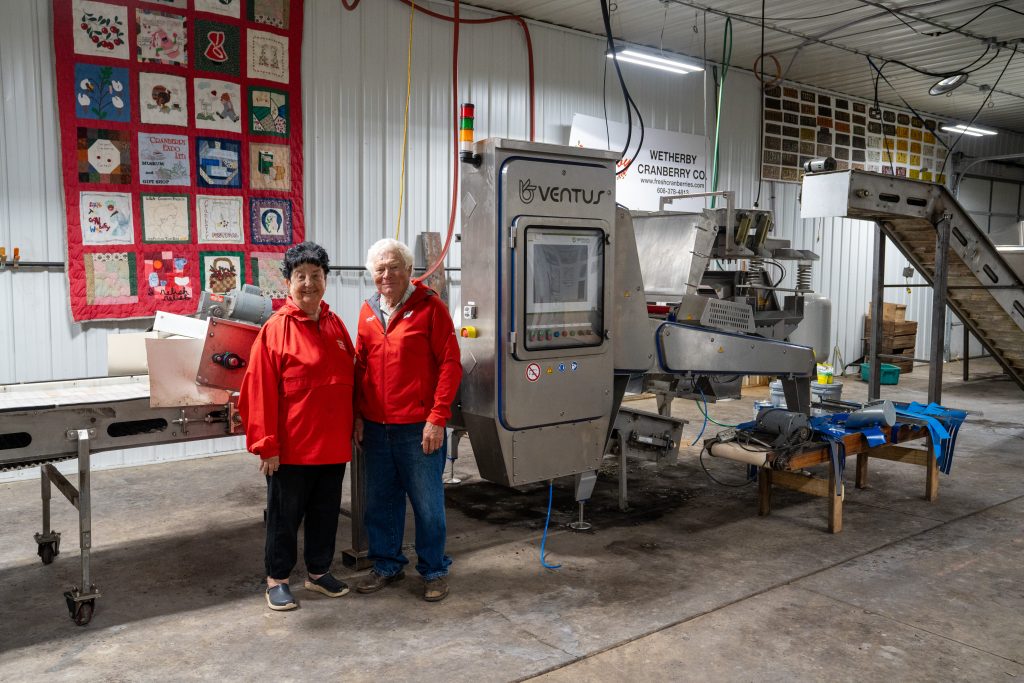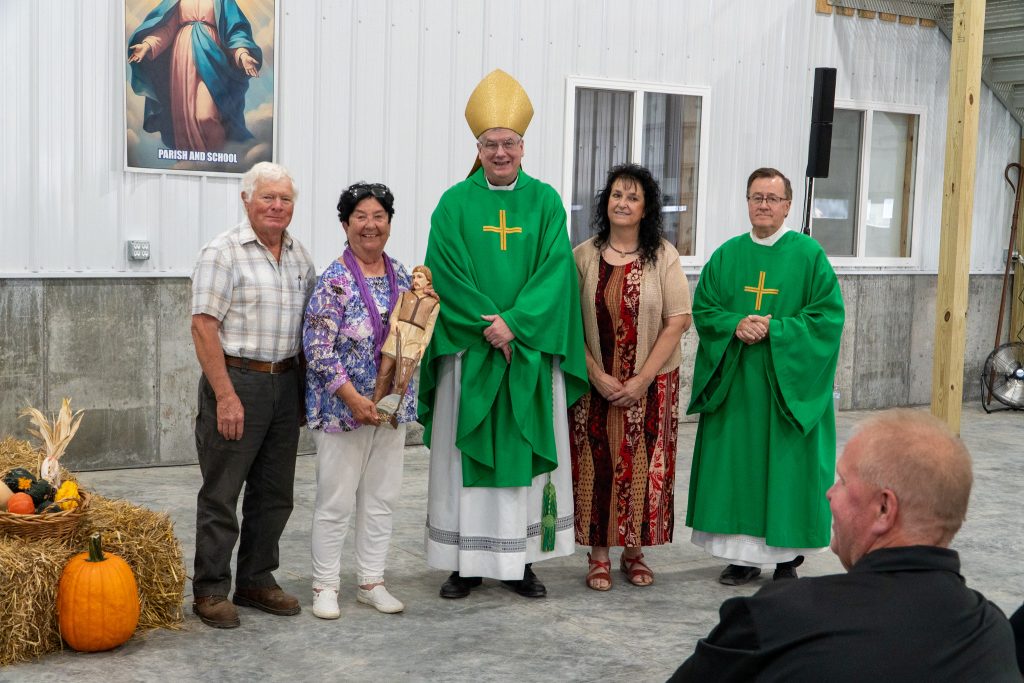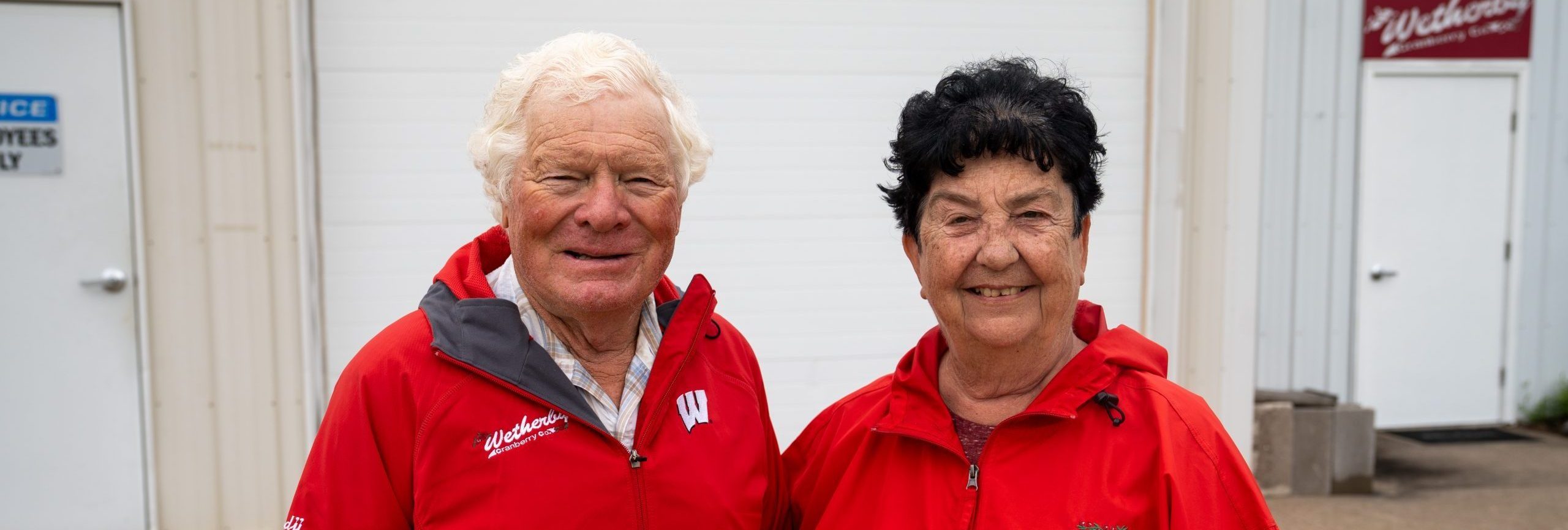Farming, faith and family on the Van Wychen cranberry marsh
Jim and Nodji Van Wychen of Warrens, find great joy in carrying on family tradition in farming and in their Catholic Faith. The story began 142 years ago when Nodji’s grandparents opened the Wetherby Cranberry Company in the marshes of Warrens.
Raising cranberries is all in the family
The business was incorporated in 1905 and has been family owned and operated ever since. “The marsh started with my grandparents, Henry and Cecelia Kissinger. After World War II, my parents, Ted and Lona Olson, became active in the business,” says Nodji.
If you asked most people what Wisconsin farmers offer the country, dairy and grains would likely be at the top of the list. However, what they may not realize is that Wisconsin accounts for 60 percent of cranberry production in the United States.
Jim and Nodji are proud to be part of this important group of farmers.
“After Jim and I married in 1973, we began working together on the marsh. I’m an only child, and cranberries have always been in my blood—I knew I would never leave the marsh,” Nodji says. “Thankfully, Jim agreed to marry not just me, but the marsh as well! That was 52 years ago, and we’ve been growing together ever since.”

The work of Wetherby Cranberry Company has already passed the fourth generation to reach the capable hands of the fifth generation of family, with the sixth generation waiting in the wings to continue the legacy of growing the bright red berries. Their son Henry, and son-in-law Mike Gnewikow, are actively involved in the day-to-day operations of the farm, while the rest of the family assist as needed.
Jim and Nodji have four children and 10 grandchildren, all of whom carry on the love for cranberries and the industry. Nodji shares, “We are a very close-knit family and are blessed to live near one another.”
Faith in every season
Although the cranberry harvest occurs over just a few months—the end of September to Thanksgiving—the farm experiences four busy seasons of growth. Each season brings joy and challenges that can vary from year to year.
Navigating farm life requires strong faith that God will watch over the farm and guide the marsh’s caretakers in providing a good crop every year. For the Van Wychens, faith expressed at their farm is central to the faith they find at church and in life.
“Jim, several of our children and grandchildren, and I are proud members of St. Andrew Church in Warrens, which is affiliated with Queen of the Apostles Parish in Tomah,” Nodji says. “Our faith is deeply important to us—both personally and in our work. Over the years, we have served our parish as council members, ushers, lectors, altar servers and extraordinary ministers of holy Communion. We rely on God to guide us through each growing season, trusting Him to provide through the forces of nature.”
The science and faith of growing cranberries
The cranberry industry in Wisconsin generates over $1 billion for the state and employs nearly 4,000 people, according to the Extension office of the University of Wisconsin-Madison. With 250 cranberry farms utilizing 21,000 acres of marshes, cranberries are grown in 20 counties of north and central Wisconsin.
Geneticists improve the reliability of the varieties of cranberries used in so many different ways—from juice to dried fruit to sauces. Farmers also improve the growing conditions of the marshes as needed.
“Cranberries are more than a crop to us; they are a heritage future and a calling,” Nodji explains. “After a long winter, when the marsh is flooded and blanketed in protective ice, God preserves the vines so they may come to life again in spring. Throughout the summer, He provides the rain and warmth needed for the vines to blossom. When He sends the honeybees to pollinate those blossoms, tiny green berries begin to form, eventually maturing into the deep crimson red fruit we harvest in the fall.”
Farming involves a partnership that requires trust in God and hard work from the entire family.
“Each season reminds us that while we may tend the land, God is the true grower. We are simply stewards of His creation,” says Nodji. “At harvest time, the culmination of our hard work is a gift we share with the world—delicious cranberries that nourish and bring joy, always with gratitude to God.”
2025 Rural Life Day hosts
This year, Wetherby Cranberry Company has been chosen by the Diocese of La Crosse to host Rural Life Day. Jim and Nodji are excited to welcome guests for this important celebration of farming in the diocese.
“We were honored, humbled and excited for our farm to be selected,” Nodji says.
The Van Wychens have attended Rural Life Day at Jack Herricks’ farm in Cashton and at Randy and Shelly Schmidt’s farm in Richland Center. Recognizing farms and those who provide food is important for the diocese.
“It is an opportunity to give thanks for the gift of land and those who steward it,” explains Nodji. “Rural Life Day is a celebration of God’s enduring love and care for His people and creation.”
The Farm’s Future
The Van Wychens know their gift is serving both the people who buy their cranberries and the Lord. The goal is for this important work to continue once their stewardship of the earth ends.
“We are a five-generation family farm. Our prayer is that the Wetherby Cranberry Company remains in our family for many generations to come,” Nodji says. “We are committed to wise conservation practices and sustainability, ensuring that this land continues to thrive. God has been very good to us. We are blessed each day we can do what we love, and we pray that He continues to bless our family, our farm and the fruit we grow.”
Rural Life Committee brings attention to Diocese of La Crosse farms
The Diocese of La Crosse is blessed to have many Catholic farmers. Each year, the Rural Life Committee highlights the work of a family farm during Rural Life Day.

This year, the committee selected the Wetherby Cranberry Company as the host farm for the Rural Life celebration. The cranberry farm has operation and in the Van Wychen family since 1903.
Anne Marie Elwing, a Doctor of Veterinary Medicine, became a committee member after her family hosted the 2018 Rural Life Day. “I didn’t know much about the process,” she says. “Hosting really opens your eyes.”
The work of the Rural Life Committee
Rural Life Committee members are spread throughout the diocese and operate farms that focus on various aspects of agriculture, including field crops, livestock and dairy. Rural Life Day’s goal is to highlight a farm where faith is as important to the family as the fruit of their labor.
“We ensure that farms from across the diocese are represented,” Anne Marie explains. “We consider various locations within this deanery. While it’s fantastic to work with a dairy farmer, we also want to explore other farms and what they have to offer. Typically, one of us has a connection to a farm, and we reach out to that family.”
Hosting Rural Life Day
Hosting the Rural Life Day is a significant task, especially during a busy season for farmers. Despite this responsibility, being the host farm is a great honor.
Highlighting the work of Christ with the family and on the farm invigorates both the faith of other farmers and the host family.
“You just know the people that are excited to be with Christ,” says Ann Marie. “Once you become a host, you become much more aware of Christ in your rural life.”
Society often fails to understand the work of farmers. The farming community is also divided by distance, making it harder to feel connected.
“There’s a lot of loneliness and isolation,” explains Anne Marie. “People are leaving this industry.”
The Rural Life Committee serves as a reminder to farmers that they are not only valuable members of the community but also important members of the Church.
“It’s a great way also for our priests to understand farming a little better,” Anne Marie says. “It’s an eye-opener when they visit the farm and talk to the family.”
The Rural Life Committee received a very positive response from the Van Wychens about being the host farm for 2025.
“The family is excited to share,” says Anne Marie. “They are building a cross made of ripe cranberries that will float in the bog.
Anne Marie believes that the honor of being a host family does not end with Rural Life Day. “Once you experience the excitement, it spreads to your parish and deanery,” she says. “A rural parish still needs to understand rural life. It brings us back to our connection with Jesus and rural life and feeding the world.”
Story By Mary Kay McPartlin
Published in the Fall 2025 edition of Catholic Life magazine

